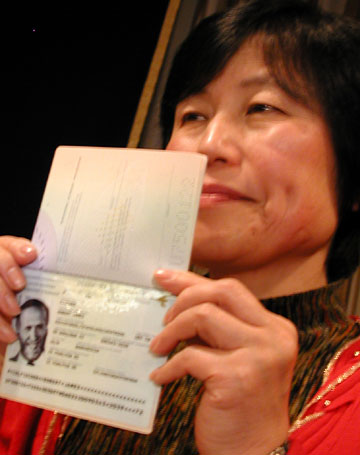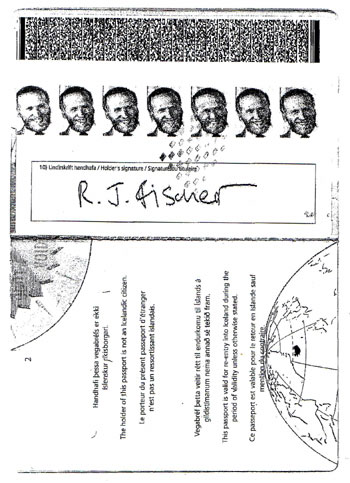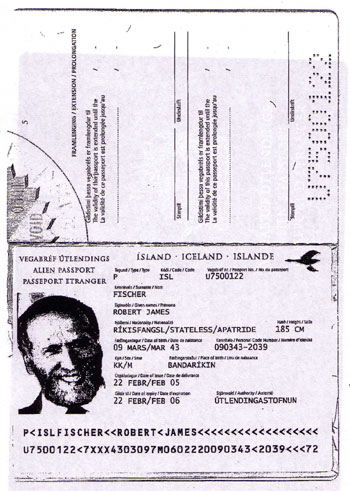Iceland Awaits Bobby Fischer
No challenge is too risky for the
Captain. Even after nine Kirins he usually finds himself
confident enough to perform his Spider-man imitation up the
side of Tokyo Tower.
 This
week he is squaring off with Bobby Fischer, the chess Grandmaster
presently entwined in the match of his life in
Japanese detention. If his stay in Japan doesn’t
get Fischer, the Captain certainly will with his knight to
rook four…
This
week he is squaring off with Bobby Fischer, the chess Grandmaster
presently entwined in the match of his life in
Japanese detention. If his stay in Japan doesn’t
get Fischer, the Captain certainly will with his knight to
rook four…
It is the most intriguing item to emerge from
Iceland since Bjork’s last album, and Bobby Fischer’s
got it, or it at least his legal team does.
It is his passport, and this time it is valid.
At the Foreign Correspondents’ Club of
Japan on Tuesday, his Japanese fiancée and president
of the Japan Chess Association, proudly held the opened document
next to her right cheek, the chess Grandmaster’s smiling
face up against hers.
John Bosnitch, head of the Committee to Free
Bobby Fischer, described the passport, which was received
by Fischer’s legal team on Monday from the Icelandic
Embassy in Tokyo, as the defeat of “a major stumbling
block.”
After stating that the 62-year-old Fischer,
who was detained in Japan last year for traveling on an invalid
U.S. passport, should now be free to legally leave Japan,
Bosnitch announced that the next move is up to the Japanese
Government.
“If this man is not freed this week,”
Bosnitch said, “we will seek eminent persons around
the world, other political prisoners around the world, to
come out in favor of Bobby Fischer and to send letters to
the United Nations and discuss whether Japan is fit to be
a member of the Security Council.”
The passport is the latest chapter in Fischer’s
ongoing battle against being deported to the United States,
where he is sought for violating economic sanctions by accepting
payment for a chess match in Yugoslavia in 1992. Iceland,
the location of Fischer’s 1972 world championship chess
victory over the Soviet Union’s Boris Spasky, now hopes
to soon be welcoming Fischer as one of its own very soon.
Fighting through Japan's bureaucracy, however, is proving
to be Fischer's toughest match yet.
The eager and brash showman, Bosnitch gave
this Friday as the deadline for Fischer’s release. If
that is not granted, Fischer’s legal team will sue the
Japanese Government.
“We will seek international condemnation
by individuals, companies, chess clubs, human rights organizations,
and just normal human beings, single individuals and families,”
Bosnitch insisted, “to condemn the government of this
country - not the people of Japan - but the government that
rules them, not governs them, but rules them.”
 The
Fischer legal team interprets Japanese law to say that a person
who cannot be deported to his nation of citizenship, which
the team said is the case since Fischer filed an appeal against
his deportation to the U.S. in August of last year (a matter
presently in limbo within the Japanese courts), that person
is eligible for voluntary departure to a third country. In
this case, that would be Iceland and its 300,000 people. An
open airline ticket to Iceland has been purchased in Fischer’s
name.
The
Fischer legal team interprets Japanese law to say that a person
who cannot be deported to his nation of citizenship, which
the team said is the case since Fischer filed an appeal against
his deportation to the U.S. in August of last year (a matter
presently in limbo within the Japanese courts), that person
is eligible for voluntary departure to a third country. In
this case, that would be Iceland and its 300,000 people. An
open airline ticket to Iceland has been purchased in Fischer’s
name.
Given this, the committee is baffled as to
the Japanese Government’s reason for holding Fischer.
Masako Suzuki, Fischer’s lawyer, said there is no legal
ground for Fischer’s continued detention. She could
only say that the government has termed Iceland’s willingness
to accommodate Fischer as “irrelevant.”
“I cannot understand their argument at
all,” Suzuki said. “But the attorney of the Ministry
of Justice says only that (the irrelevance of Iceland) and
then she looks down at the table. That's all…I am really
ashamed of such illegal behavior of the Japanese government.”
Though his passport photo
features a beaming Bobby, his Japan tale has been far from
pleasant. He was detained in July last year for violating
immigration rules when he was found to be departing Japan
for the Philippines with an invalid passport. In a letter
in which he described the U.S. and Japanese governments as
“filthy,” Fischer renounced his U.S. citizenship
in August. Soon after he was transferred from the Narita Airport
detention center to a more permanent cell in a detention center
in nearby Ibaraki Prefecture, his home when Watai announced
their plans to marry last year.
A delegation from Iceland arrived in Japan
last week to offer additional support. Iceland sees itself
as “a great chess nation,” said former Iceland
Chess Federation president Einar Einarrson. He emphasized
that Iceland, values its heroes - of which Fischer is one
- as national treasures.
Saemundur Palsson, Fischer’s bodyguard
at the time of the 1972 match, said he observed that Fischer’s
health has been deteriorating. During a 30-minute visit with
the chess genius in Ibaraki, Fischer told Palsson he had been
losing weight since July.
“It is said to cheat in chess is bad,
but to cheat on tourists like this is even worse," said
Einarrson.
Palsson also relayed a story from last week
that exemplified escalating frustration in Fischer. A dispute
in his cell over the lack of an egg in his breakfast meal
resulted in Fischer tearing the shirt of one guard. After
Fischer was subsequently moved from his cell, another guard
began berating him for his behavior, “somehow his arm
(Bobby’s) got loose and he smacked him (the guard) in
the face,” Palsson said. (The Mainichi Daily News
later reported that the guard suffered a broken nose.) Fischer
spent four days in solitary confinement following the incident.
Gardar Sverrisson, a human rights activist
in Iceland, described Fischer’s detention as a "brutal
abuse of power." He added, “I promise you, as long
as our hearts keep on beating, we will not stop this fight.”
 Fischer’s
passport is designated “alien” and allows him
to travel within the 15 countries that make up the European
Schengen Zone. Bosnitch ruled out the possibility of Fischer’s
lack of Icelandic citizenship as being a hurdle in freeing
the chess whiz.
Fischer’s
passport is designated “alien” and allows him
to travel within the 15 countries that make up the European
Schengen Zone. Bosnitch ruled out the possibility of Fischer’s
lack of Icelandic citizenship as being a hurdle in freeing
the chess whiz.
“This is irrelevant,” Bosnitch
explained. “It's explicit in the Japanese law. Citizenship
has no relationship to your freedom of travel.
We have an injunction (through the appeal). He can't go to
the United States. We won't let him go there.”
News reports from the Mainichi
Daily News and The Associated Press have surfaced
in recent days indicating that the U.S. Government will indict
Fischer for money laundering and tax evasion. Bosnitch downplayed
the issue and implied that the situation is part of a U.S.
conspiracy against Fischer. "If it quacks like duck,
and if it waddles like a duck, it's a duck," Bosnitch
explained after raising the conspiracy issue himself.
In recent years, Fischer, a one-time poster
boy for the U.S. in the its clash with the Soviet Union, has
verbally attacked the U.S., lauding the terrorist attacks
of 2001 and decrying the country for its lack of culture
and large number of "lunatic" Jews.
His rematch with Spassky thirteen years ago,
in which Fischer once again triumphed, violated economic sanctions
in place in Yugoslavia. Imposed by the United Nations, the
sanctions were intended to assist in the implementation of
the Dayton Peace Accord and the removal of Slobodan Milosevic
as president.
Iceland, though, is prepared to look beyond
these recent spats.
"Those of us who live in democratic countries,
even if we act foolishly, speak foolishly, and even invest
foolishly, it is a part of life and basic human rights
(to live) with no penalties,” said Einarsson. “Therefore,
it baffles our minds that any person is treated like Bobby
Fischer has been treated.”
The Nordic nation simply wants to recognize
Fischer for his historic victory over Spassky.
“We concede to him today to be an important
part of Iceland's modern saga,” said Einarsson of Fischer’s
legacy, “and he will always live in the minds of our
people and, hopefully, all chess lovers forever as the greatest
chess player of the world."
Note: Ryann Connell of the Mainichi
Daily News contributed to this report from the Tokyo
Bureau.

